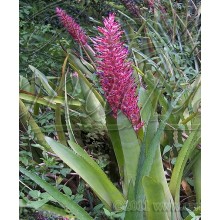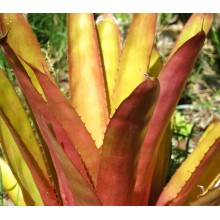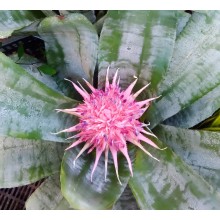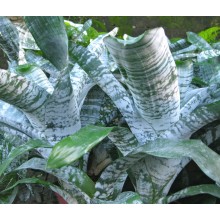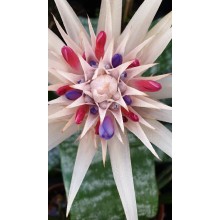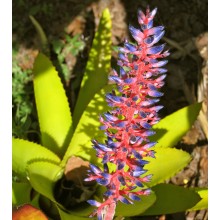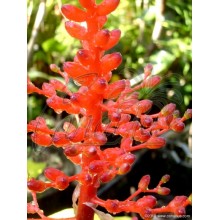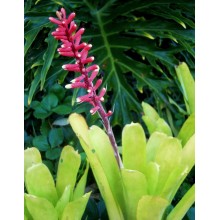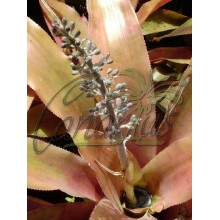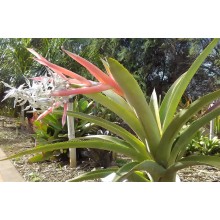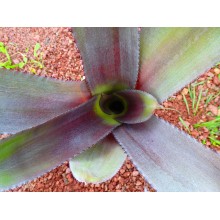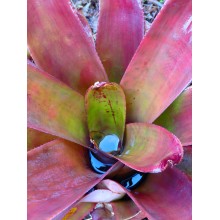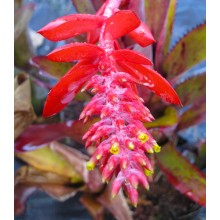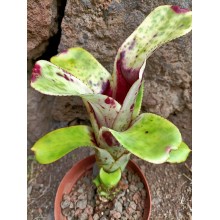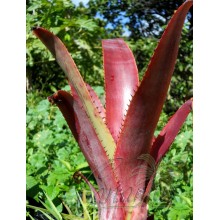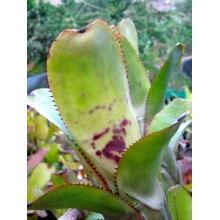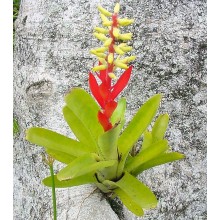Plantes générales Il y a 1885 produits.

Si vous aimez les plantes exotiques, vous venez au bon endroit. Canarius offre le dur-à-trouver des plantes exotiques qui sont rarement disponibles dans les centres de jardin. Notre magasin a des espèces naturelles ainsi que des hybrides rares. Nous offrons des plantes exotiques en provenance des Îles Canaries.
Les commandes sont envoyées partout en Europe et aussi dans le monde entier. Les colis seront atteindre votre maison dans quelques jours après l'expédition (mais nous avons aussi besoin de quelques jours pour le traitement). N'hésitez pas à nous contacter si vous avez des questions.
Sous-catégories
-
Succulentes
Les plantes les plus intéressantes habitent dans les déserts du monde et les zones sèches. Canarius propose une sélection croissante de plantes succulentes de qualité maximale, car elles sont cultivées à l'extérieur en plein soleil des Canaries.
Les succulentes ou «plantes grasses» sont des espèces de rétention d'eau, adaptées aux conditions sèches. Ils stockent succum (jus, eau) dans leurs feuilles, les tiges ou racines, et ils présentent souvent une apparence robuste et charnue.
-
Exotiques
Les plantes exotiques sont des espèces provenant de contrées éloignées, qui ne sont pas dans leur habitat naturel. Généralement, elles sont à caractère décoratif, elles disposent d’un feuillage dense avec des fleurs de couleur vive et ont une forme inhabituelle… Ci-après, vous pourrez découvrir une grande variété de plantes exotiques, allant des broméliacées, héliconies et palmiers aux plantes d’intérieur.
Les plantes exotiques n'ont pas forcément d'utilité particulière, les collectionneurs achètent ce genre de plantes avant tout pour leur rareté et pour décorer des espaces intérieurs ou en plein air, selon l’environnement.
-
Fruits, Herbes et Plantes Médicinales
Les Fruits, les Herbes et les Plantes Médicinales sont destinées à offrir une meilleure santé. Dans cette section, chaque type de plante offre des propriétés bienfaisantes, que ce soit des arbres fruitiers (le Feijoa, l’Ananas, le Fino de Jete, etc.) et des plantes pour la santé, telles que le Graviola, l’Aloe Vera, le Callisia fragrans, etc. Au sein du métabolisme normal des êtres vivants, l’organisme produit certaines substances à partir de nutriments latents dans l’environnement; certaines de ces réactions chimiques font partie du processus de toutes (ou presque) les espèces. Normalement, les composants utiles sont concentrés dans certaines parties: feuilles, graines, fleurs, etc. Découvrez quelle plante vous est recommandée et achetez-la en ligne!
-
Spécial
Sur canarius.com, nous essayons de repousser les limites du domaine de la botanique. Sur notre boutique en ligne, nous tentons de facilité le processus achat/vente des plantes partout dans le monde. C’est pourquoi, nous cultivons les espèces les plus communes ainsi que les plantes les plus spéciales, comme nous pouvons le voir dans cette section.
-
Aechmea distichantha var. schlumbergeri
Aechmea distichantha var. schlumbergeri
Cold-hardy Aechmea found in Bolivia to NE. Argentina. It is a large, spiny plant 50-80 cm tall, producing long-lasting colourful inflorescences in Spring. Great in gardens or in tall pots. Hardy to about -6 C.
22,60 € -
Aechmea distichantha x fulgens discolor
Aechmea distichantha x fulgens discolor
New cold-hardy hybrid with spectacular colours. Leaves are golden to bronze, orange and dark green, the inflorescence is long-lasting.
37,70 € -
Aechmea fasciata
Aechmea fasciata
This particular clone of Aechmea fasciata is a wild-type form with the tipical tiny teeth on the leaf margins. Aechmea fasciata is one of the most popular of all bromeliads. It tolerates a wide range of conditions, including some cold weather. Its large pink inflorescences are a true beauty - only comparable to those of the most tropical, tender types.
12,50 € -
Aechmea fasciata 'Spineless'
Aechmea fasciata 'Spineless'
This is a non-hybrid, almost-spineless selection of this well known beautiful bromeliad. Aechmea fasciata is native to the cool forests in Rio de Janeiro, where it grows between 500 and 1200 m of altitude. It can be grown in pots or mounted.
17,50 € -
Aechmea fasciata 'White Spineless'
Aechmea fasciata 'White Spineless'
This is a non-hybrid, almost-spineless selection of this well known beautiful bromeliad. Aechmea fasciata is native to the cool forests in Rio de Janeiro, where it grows between 500 and 1200 m of altitude. It can be grown in pots or mounted.
19,20 € -
Aechmea fendleri
Aechmea fendleri
An old classic in fine tropical gardening. This mid to large bromeliad has stiff glossy leaves and a very long lasting, bright inflorescence, shimmering in blue and red.
29,30 € -
Aechmea fulgens var. fulgens
Aechmea fulgens var. fulgens
This bromeliad shows the reddest red you can imagine. Flowers and fruits shine during months above the apple green wide foliage.
14,50 € -
Aechmea gamosepala
Aechmea gamosepala
Fast growing mat-forming bromeliad. Small rosettes of pale green leaves produce bright spikes of pink and purple flowers, in the colder winter months. It can take low temperatures with little or no damage at -7 C (20 F) for several hours.
13,20 € -
Aechmea gamosepala var. nivea
Aechmea gamosepala var. nivea
Supreme flowering bromeliad. This variety was described in 1962 from Santa Catarina, in SE Brazil. It is much taller and stouter than the typical A. gamosepala and bears pink-and-white spikes in Spring. Tolerant of moderate cold.
14,00 € -
Aechmea leptantha 'Albo-marginata'
Aechmea leptantha 'Albo-marginata'
Large variegated bromeliad with bold rainbow colours, showing an impressive array of orange, pink, green, yellow and red.
56,00 € -
Aechmea lueddemanniana rubra
Aechmea lueddemanniana rubra
Elegant bromeliad with colourful mottled leaves. It bears a 40-60 cm long spike, with blue flowers. The show lasts for months as it becomes an attractive infructescence with white berries turning purple. Frost sensitive.
24,50 € -
Aechmea maculata
Aechmea maculata
Mid sized bromeliad, with a compact green rosette with thick curly leaves. It blooms in late winter to spring with an amazing inflorescence with pink bracts and yellow flowers.
26,00 € -
Aechmea mcvaughii- Ursulaea mcvaughii
Aechmea mcvaughii- Ursulaea mcvaughii
Ursulaea is a new genus, still uncommon in cultivation. It grows as an Aechmea with a beautiful pink-white fuzzy inflorescence and blue flowers. Leaves are silvery underneath, green if hot and shady and golden-copper in cool sunny weather.
56,80 € -
Aechmea mulfordii 'Malva'
Aechmea mulfordii 'Malva'
This is one of finest clones of the large sized, showy Aechmea mulfordii. 'Malva' has wide and thick silvery-mauve leaves that come in a colour different from most other bromeliads. ... and with the tall yellow inflorescence is an absolute winner!
37,00 € -
Aechmea mulfordii 'Rubra'
Aechmea mulfordii 'Rubra'
This is the true 'Rubra' clone of Aechmea mulfordii, with deep pink to orange tones in the leaves. It becomes a spectacular plant, excellent for landscaping or in outstanding pots.
37,00 € -
Aechmea nudicaulis 'Blumenau'
Aechmea nudicaulis 'Blumenau'
First time offering of a new clone of Aechmea nudicaulis collected on the hills above Blumenau in Southern Brazil. Small sized, compact, with colourful speckled leaves with rounded tips.
28,00 € -
Aechmea nudicaulis 'Viñales'
Aechmea nudicaulis 'Viñales'
Upright Northern form of Aechmea nudicaulis, with tapering leaftips, often curly. Leaves turn purple-reddish in the cooler or drier months. It is robust and grows a bit larger than other nudicaulis.
18,30 € -
Aechmea nudicaulis green
Aechmea nudicaulis green
NEW;Aechmea nudicaulis is a Bromeliad species in the genus Aechmea, which is often used as an ornamental plant. This species is native to Central America, the West Indies, central and southern Mexico, and northern and central South America.
16,70 €
Pour le moment, il ya peu de produits dans cette catégorie Plantes générales




















